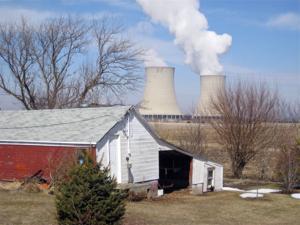(The Center Square) – As the state is selected to join a nuclear power collaborative, some are pushing back against the state’s projected move toward more nuclear energy.
Illinois is one of the top states in the nation for nuclear energy. However, there is a hold on constructing new-generation facilities in the state.
The Senate passed Senate Bill 76 last week. If passed by the House and approved by the governor, the measure would delete language in state statute that provides that no construction shall commence on any new nuclear power plant located within the state. Illinois is one of only 12 states with a moratorium banning future construction of nuclear plants.
On Monday, the Illinois Commerce Commission announced it was selected to join the Advanced Nuclear State Collaborative, a partnership that seeks to bring together state utility regulators from across the country to discuss the “unique needs and challenges tied to deploying new nuclear generation.”
“With 11 nuclear power reactors across the state, Illinois is home to the most nuclear facilities in the country. With that comes a wealth of knowledge and research, and as the ICC’s representative to this collaborative, I will be able to draw on the expertise of nuclear experts here in Illinois and the ICC Staff to help the ANSC develop use cases and innovate regulatory treatment models for advanced nuclear reactors,” ANSC Commissioner Michael Carrigan said in a news release.
David Kraft, director of Nuclear Energy Information Service, a nonprofit group with a goal to “create a nuclear free world,” told the Center Square Illinois’ collaboration shouldn’t lose site of current enacted policies.
“While we value ‘lessons learned’ and improved nuclear safety, this should not supplant the goals of [the Clean Energy Jobs Act], expanding renewable energy, energy efficiency, energy storage and improved transmission, the real future of U.S. energy,” Kraft said.
Last week, Gov. J.B. Pritzker was asked about possibly expanding nuclear energy in Illinois.
“Banning nuclear entirely in a world where it becomes much safer, things are smaller, less prone to an accident, more likely for us to be able to maintain them for a long time, that is something worth consideration,” Pritzker said.
Kraft said money is being dedicated for a technology that does not exist and may not exist for some time.
“The one company that has received the contract to build has said its first proof of concept reactor will not be available till December 2029,” Kraft said. “That means that even if the thing worked, you’re not going to have commercially enough of these built until the 2030s, or maybe the 2040s.”
Kraft said once invested, it’s difficult to turn away.
“Once you put money heavily into something, you’re tempted to see it through to the end whether it works or not,” Kraft said. “That’s one of the big fears about the small modules, once they get their foot in the door, folks are going to be reluctant to walk away.”
According to the NEIS, a similar project in Utah saw the projected cost of the NuScale SMNR reactor increase from $55 to $100 per megawatt per hour before any construction was started, leading the company to bail on the project due to those costs.
A news release from the NEIS says that the state’s moratorium was enacted to protect Illinois from becoming a high-level radioactive waste dump, saying the state should not build any new plants without having a waste removal plan.
Kraft said the state still does not have that issue worked out.
“I have frequently used the analogy of building skyscrapers in Chicago without bathrooms. That’s essentially how the nuclear industry is operating since the 1950s,” Kraft said. “It has no place to dispose of the radioactive waste in any environmentally responsible way, yet it is still given the opportunity to create it.”







